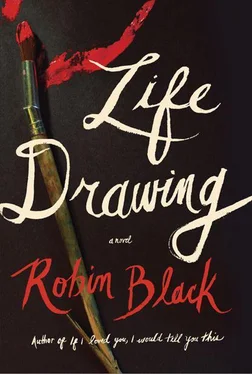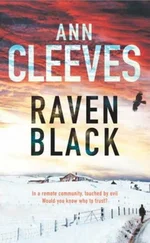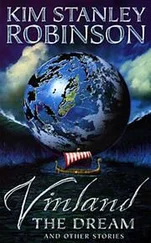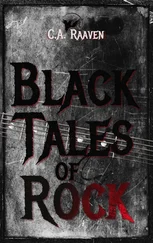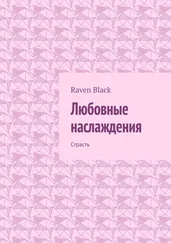“That’s how I feel about my father sometimes,” I said. “I’m not saying it’s the same, God knows. It’s not. But just … just the way it’s all taken his … his particular nature away. There’s no conversation anymore about what he might do or how he might react. Him: Sam Edelman. It’s all how an Alzheimer’s patient might react. The things Alzheimer’s patients say. He’s become generic.”
“Maybe at the stress points we all become generic.” She told me about pictures she had once seen of people on roller coasters. As soon as they were terrified, they all looked exactly the same. “That was the salvation though — in my case, I mean. What saved me was finally admitting that I was no different from every other abuse victim. There was no special skill I had that would make him change, no exemption because he was my husband and not some other woman’s husband. We were just another married couple stuck in roles you could hear about on half a dozen talk shows any given week. And I couldn’t stand the idea of having had my … my will taken away. My self. Once I admitted the truth, I had to leave. And once it became physical, I stopped being able to fool myself. Though even that … Even that didn’t happen right away.”
“I’m just glad you got out. I admire your strength.”
“Well, it certainly felt like strength at the time. Like an enormous act of heroism. Which in retrospect …” She didn’t finish the thought, but with a vigor I had come to expect swung us into the gravel parking lot and slammed to a stop.
Three o’clock on the Tuesday after Labor Day weekend was a quiet time at the market. The local mothers were back to picking their children up from school or waiting for them at bus stops near home; and the after-work rush — a country-style rush of maybe twenty, twenty-five at a time — was still a few hours off. That day, we had the place almost to ourselves, just an elderly couple; a young man; a younger couple. A little more than half a dozen of us, against the backdrop of stalls, bright signs, rough-hewn wood tables, aluminum ones, canvas roofs.
Alison always brought a list. I never did. She had particular vendors she preferred, and knew things like when the spinach was due for harvest and who was slaughtering chickens that week. She would ask questions and get advice on her own little garden patch, while I always hung back a bit, wandering from stall to stall like a child waiting for her mother to be done. I did make occasional purchases, but those were impulse buys and generally based on something visual. I loved the garlic scapes, the odd elongated green of them, the strange irregular curves, and so always bought a bunch when they were there, though I’d never found a way to cook them that I liked. And the mushrooms, driven over from Kennett Square; I loved their shadows and mysteries and swells, the sense of secrecy they carried, little embodiments of life lived in the dark. That day, I bought two zucchini largely because I felt sorry for the long-faced farmer drowning in his bumper crop; and then a dozen eggs, and a wheel of local Camembert that I knew Owen liked.
As I wandered, I thought of what Alison had said about becoming generic. It didn’t just remind me of my father, I realized. It was also close to what I had felt about my affair. One day we were two fantastically, uniquely interesting individuals who had been lucky enough to find each other — even if under terrible circumstances. And then, five months later, I was that pathetic woman hoping a married man who would never leave his wife for me would leave his wife for me. A cliché. A soap opera trope. The humiliation of that had pushed me to end it, as much as anything else had.
When I glimpsed Alison a few stalls away, she was at one of the crafty ones, filled with jams and quilted potholders, handmade soaps. I watched her for a couple of minutes before approaching her. It was still difficult to process all she had endured. The image of her being hit sickened me.
When I joined her, she was asking questions in her curious way about varieties of vinegars. I admired how easily her mind could slip with genuine interest from one topic to the next. I had lived in the area nearly three years with only a minimal, outsider’s need to know about the town or the life of the county, certainly no interest in chatting up the locals about their produce and home-canned goods; while she reveled in the human contact, seemed unable to imagine living in a place and not weaving herself into it.
I noticed the name on the stall. Mayhew Farm . I looked at the woman behind the counter. She was in her seventies, I thought, her cheeks a bit puffy, her skin lined, but still I could detect a resemblance there, in the square of her jaw, time-softened as its angles were, in the slope from her forehead through her short, slightly squat nose.
“Are you a Mayhew?” I asked. “Of Mayhew Farm,” I added as though she needed me to explain.
“I used to be,” she said. “Though I’ve been a Thompson for thirty-nine-odd years.”
Alison picked up a bottle. “It must be wonderful,” she said. “To feel so connected to a place … to be somewhere for so long …” She put it back on the vinyl gingham table cover. “I’m going to try the strawberry.” She turned to me. “Strawberry vinegar with vanilla ice cream. How does that sound?”
“It sounds good. It sounds incredible.” I looked at the woman again. “Has the family been here a long time?” I asked. “The Mayhews?”
She took a twenty from Alison and opened her cash box. “We’ve had the farm over a hundred years.”
“I was just wondering … I heard about a Mayhew. From a while back. John. Jack. Or Jackie … He was in World War I.”
She looked up at me, startled. “Jackie Mayhew? Jackie Mayhew was my father’s brother.” Her eyes narrowed. “How could you be hearing about Jackie Mayhew?”
“It’s a long story,” I said; and she looked around meaningfully at the emptiness around us, the absence of anyone pressing me to hurry through. “I’m an artist,” I began. “I live with my husband in what used to be the Garrick place.”
“I went to school with Emily Garrick. And her brother Freddy.”
“We bought the house as part of an estate sale. I never met either of them. But we were doing some work on a bathroom earlier this summer …” I started to tell her about the newspapers and a little about the paintings. At some point, Alison touched my shoulder and pointed to a poultry stall. “I won’t be long,” she said, and walked away.
“Jackie Mayhew was one of the boys. One of the obituaries.”
“You have his obituary?”
I repeated that I did. I told her my name and she told me hers, Kathleen. Kathleen Thompson, but Kathleen Mayhew before that.
“My poor father,” she said. “He never got over it. His baby brother. He was there too, you know. But he took ill and never had to fight. He used to say that dysentery had saved his life.”
The young couple had joined us at the stall. “I should let you work,” I said, moving aside.
“We were wondering if you have any of that mixed berry jam today,” the young man said.
“We give it as gifts all the time now,” the young woman said. “Everyone loves it.”
“Oh, sure. We always bring lots of that.” And then to me, “So strange, you mentioning poor Jackie Mayhew. I haven’t thought of him in years.”
But then she moved back to her customers. She had been curious — but unconcerned, it seemed. He was a family myth, a sadness of the past for people themselves long dead.
I took a business card off her table as I left.
Alison greeted me by the car with the news she’d had a text from Nora. “She hadn’t told Paul where we were. I knew she wouldn’t have. He called her friend Heather and got the information that way. Said he was surprising Nora as a treat.”
Читать дальше
